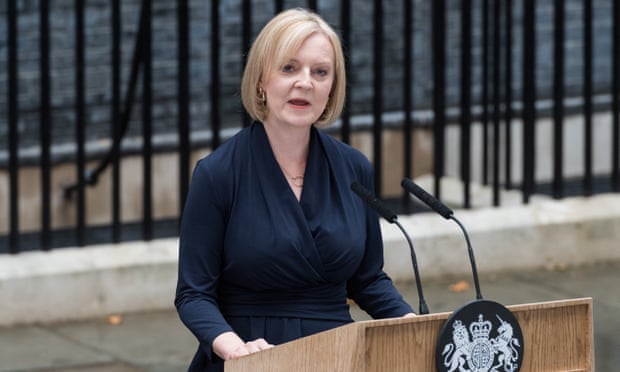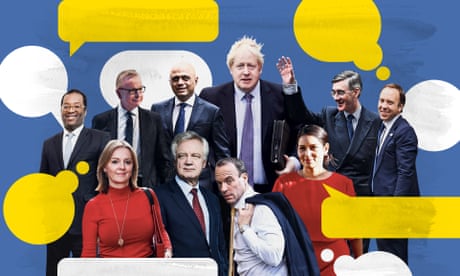UK
Has Liz Truss handed power over to the extreme neoliberal thinktanks?The prime minister is in hock to a group of rightwing lobbyists who are themselves indebted to oligarchs and corporations


‘To a greater extent than any previous leader, Liz Truss’s politics have been shaped by organisations that call themselves thinktanks, but would be better described as lobbyists who refuse to reveal who funds them.’
Photograph: Anadolu Agency/Getty Images
George Monbiot
Fri 23 Sep 2022
Who chose Liz Truss? Conservative party members, of course. Who are they? Disproportionately rich, white, older men living in the south of England. But there are some members whose profile we have no means of knowing. They don’t live in the UK, have never been residents or citizens here and have no right to vote in our elections. Astonishingly, since 2018 these foreign members have been permitted to determine who the UK prime minister should be.
The Conservative party’s rules of association are an open invitation to anyone who wants to mess with our politics. There seems to be nothing to stop agents of another government from registering as members with Conservatives Abroad. Nor, it seems, is there anything to stop one person (or one botswarm) applying for multiple memberships. So much for the party of patriotism, sovereignty and national security.
This open invitation, to judge from the little information we can glean, has yet to be fully exploited. Perhaps foreign governments haven’t yet realised what a golden opportunity they’ve been given. Perhaps they simply can’t believe how irresponsible the Tories are.
But we don’t need to suggest a campaign by another state to see Truss as a kind of Manchurian Candidate, subverting what remains of our democracy on behalf of undemocratic interests. As a rule, the more loudly a politician proclaims their patriotism, the more likely they are to act on behalf of foreign money. Every recent Conservative prime minister has placed the interests of transnational capital above the interests of the nation. But, to a greater extent than any previous leader, Truss’s politics have been shaped by organisations that call themselves thinktanks, but would be better described as lobbyists who refuse to reveal who funds them. Now she has brought them into the heart of government.
Her senior special adviser, Ruth Porter, was communications director at the Institute of Economic Affairs (IEA), an extreme neoliberal lobby group. An investigation by the democracy campaign Transparify listed the IEA as “highly opaque” about its funding sources. We know from a combination of leaks and US filings that it has a history of taking money from tobacco companies and since 1967 from the oil company BP, and has also received large disbursements from foundations funded by US billionaires, some of which have been among the major sponsors of climate science denial. When she worked at the IEA, Porter calledfor reducing housing benefit and child benefit, charging patients to use the NHS, cutting overseas aid and scrapping green funds.

How the right’s radical thinktanks reshaped the Conservative party
She then became head of economic and social policy at Policy Exchange, which was also listed by Transparify as “highly opaque”. Policy Exchange is the group that (after Porter left) called for a new law against Extinction Rebellion, which became, in former home secretary Priti Patel’s hands, the Police, Crime, Sentencing and Courts Act. We later discovered it had received $30,000 from the US oil company Exxon.
Liz Truss, according to the head of the IEA, has spoken at more of its events than “any other politician over the past 12 years”. Two of Truss’s meetings with the organisation were deleted from the official record, then reinstated after the deletions caused a scandal.
More importantly, Truss was the ostensible founder, in 2011, of the free enterprise group of Conservative MPs. The group’s webpage was registered by Ruth Porter, who at the time worked for the IEA. The IEA organised events for the group and supplied it with media briefings. Twelve members of the current cabinet, including several of its most senior figures, belonged to the group. Today, if you try to open its webpage, you are redirected to the Free Market Forum, which calls itself “a project of the Institute of Economic Affairs”.
Truss’s chief economic adviser is Matthew Sinclair, formerly chief executive of a similar lobbying group, the Taxpayers’ Alliance. It is also funded obscurely by foreign donors. Sinclair wrote a book called Let Them Eat Carbon, arguing against action to prevent climate breakdown. It claimed that: “Equatorial regions might suffer, but it is entirely possible that this will be balanced out by areas like Greenland.” In other words, we can trade the lives of billions of people against the prospects of some of the least inhabited places on Earth. It’s among the most callous and ignorant statements I’ve ever seen.
Truss’s interim press secretary, Alex Wild, was research director at the same organisation. Her health adviser, Caroline Elsom, was senior researcher at the Centre for Policy Studies, which was listed by Transparify as – you guessed it – “highly opaque”. Her political secretary, Sophie Jarvis, was head of government affairs at the Adam Smith Institute (also “highly opaque”), and funded, among others, by tobacco companies and US foundations.
These groups represent the extreme fringe of neoliberalism. This maintains that human relationships are entirely transactional: we’re motivated above all by the pursuit of money, which shapes our behaviour. Yet, hilariously, when you challenge them about their funding, they deny that the money they receive influences the positions they take.
For decades, policy development on the right was shaped as follows. Oligarchs and corporations funded the thinktanks. The thinktanks proposed policies that, by sheer coincidence, suited the interests of oligarchs and corporations. The billionaire press – also owned by oligarchs – reported these policy proposals as brilliant insights by independent organisations. Conservative frontbenchers then cited the press coverage as evidence of public demand: the voice of the oligarchs was treated as the voice of the people.
In his autobiography Think Tank, Madsen Pirie, founder of the Adam Smith Institute, explained how it worked. Every Saturday, in a wine bar in Leicester Square, staff from the Adam Smith Institute and the Institute of Economic Affairs would sit down with Conservative researchers and leader writers and columnists from the Times and Telegraph to plan “strategy for the week ahead” and “co-ordinate our activities to make us more effective collectively”. The Daily Mail weighed in to help the lobbyists refine their arguments and ensure there was a supportive article on its leader page every time they published a report.
But now the thinktanks don’t need a roundabout route. They are no longer lobbying government. They are the government. Liz Truss is their candidate. To defend the interests of global capital, she will wage war against any common endeavour to improve our lives or protect the living planet. If Labour is looking for a three-word slogan with which to fight the next election, it could do worse than “Mend This Country”.
Fri 23 Sep 2022
Who chose Liz Truss? Conservative party members, of course. Who are they? Disproportionately rich, white, older men living in the south of England. But there are some members whose profile we have no means of knowing. They don’t live in the UK, have never been residents or citizens here and have no right to vote in our elections. Astonishingly, since 2018 these foreign members have been permitted to determine who the UK prime minister should be.
The Conservative party’s rules of association are an open invitation to anyone who wants to mess with our politics. There seems to be nothing to stop agents of another government from registering as members with Conservatives Abroad. Nor, it seems, is there anything to stop one person (or one botswarm) applying for multiple memberships. So much for the party of patriotism, sovereignty and national security.
This open invitation, to judge from the little information we can glean, has yet to be fully exploited. Perhaps foreign governments haven’t yet realised what a golden opportunity they’ve been given. Perhaps they simply can’t believe how irresponsible the Tories are.
But we don’t need to suggest a campaign by another state to see Truss as a kind of Manchurian Candidate, subverting what remains of our democracy on behalf of undemocratic interests. As a rule, the more loudly a politician proclaims their patriotism, the more likely they are to act on behalf of foreign money. Every recent Conservative prime minister has placed the interests of transnational capital above the interests of the nation. But, to a greater extent than any previous leader, Truss’s politics have been shaped by organisations that call themselves thinktanks, but would be better described as lobbyists who refuse to reveal who funds them. Now she has brought them into the heart of government.
Her senior special adviser, Ruth Porter, was communications director at the Institute of Economic Affairs (IEA), an extreme neoliberal lobby group. An investigation by the democracy campaign Transparify listed the IEA as “highly opaque” about its funding sources. We know from a combination of leaks and US filings that it has a history of taking money from tobacco companies and since 1967 from the oil company BP, and has also received large disbursements from foundations funded by US billionaires, some of which have been among the major sponsors of climate science denial. When she worked at the IEA, Porter calledfor reducing housing benefit and child benefit, charging patients to use the NHS, cutting overseas aid and scrapping green funds.

How the right’s radical thinktanks reshaped the Conservative party
She then became head of economic and social policy at Policy Exchange, which was also listed by Transparify as “highly opaque”. Policy Exchange is the group that (after Porter left) called for a new law against Extinction Rebellion, which became, in former home secretary Priti Patel’s hands, the Police, Crime, Sentencing and Courts Act. We later discovered it had received $30,000 from the US oil company Exxon.
Liz Truss, according to the head of the IEA, has spoken at more of its events than “any other politician over the past 12 years”. Two of Truss’s meetings with the organisation were deleted from the official record, then reinstated after the deletions caused a scandal.
More importantly, Truss was the ostensible founder, in 2011, of the free enterprise group of Conservative MPs. The group’s webpage was registered by Ruth Porter, who at the time worked for the IEA. The IEA organised events for the group and supplied it with media briefings. Twelve members of the current cabinet, including several of its most senior figures, belonged to the group. Today, if you try to open its webpage, you are redirected to the Free Market Forum, which calls itself “a project of the Institute of Economic Affairs”.
Truss’s chief economic adviser is Matthew Sinclair, formerly chief executive of a similar lobbying group, the Taxpayers’ Alliance. It is also funded obscurely by foreign donors. Sinclair wrote a book called Let Them Eat Carbon, arguing against action to prevent climate breakdown. It claimed that: “Equatorial regions might suffer, but it is entirely possible that this will be balanced out by areas like Greenland.” In other words, we can trade the lives of billions of people against the prospects of some of the least inhabited places on Earth. It’s among the most callous and ignorant statements I’ve ever seen.
Truss’s interim press secretary, Alex Wild, was research director at the same organisation. Her health adviser, Caroline Elsom, was senior researcher at the Centre for Policy Studies, which was listed by Transparify as – you guessed it – “highly opaque”. Her political secretary, Sophie Jarvis, was head of government affairs at the Adam Smith Institute (also “highly opaque”), and funded, among others, by tobacco companies and US foundations.
These groups represent the extreme fringe of neoliberalism. This maintains that human relationships are entirely transactional: we’re motivated above all by the pursuit of money, which shapes our behaviour. Yet, hilariously, when you challenge them about their funding, they deny that the money they receive influences the positions they take.
For decades, policy development on the right was shaped as follows. Oligarchs and corporations funded the thinktanks. The thinktanks proposed policies that, by sheer coincidence, suited the interests of oligarchs and corporations. The billionaire press – also owned by oligarchs – reported these policy proposals as brilliant insights by independent organisations. Conservative frontbenchers then cited the press coverage as evidence of public demand: the voice of the oligarchs was treated as the voice of the people.
In his autobiography Think Tank, Madsen Pirie, founder of the Adam Smith Institute, explained how it worked. Every Saturday, in a wine bar in Leicester Square, staff from the Adam Smith Institute and the Institute of Economic Affairs would sit down with Conservative researchers and leader writers and columnists from the Times and Telegraph to plan “strategy for the week ahead” and “co-ordinate our activities to make us more effective collectively”. The Daily Mail weighed in to help the lobbyists refine their arguments and ensure there was a supportive article on its leader page every time they published a report.
But now the thinktanks don’t need a roundabout route. They are no longer lobbying government. They are the government. Liz Truss is their candidate. To defend the interests of global capital, she will wage war against any common endeavour to improve our lives or protect the living planet. If Labour is looking for a three-word slogan with which to fight the next election, it could do worse than “Mend This Country”.

George Monbiot is a Guardian columnist
No comments:
Post a Comment